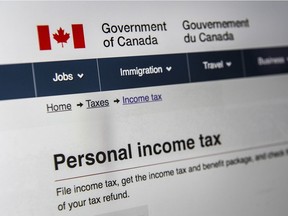Volunteers can help area families with the often-daunting process

Every year, 10 to 12 percent of Canadians don’t file their taxes, the United Way Perth Huron’s director of social research and planning says.
Advertisement 2
Article content
Part of this is due to the simple fact that access to tax services isn’t equitable, notes Kristin Crane. That’s why the local United Way, with the help of Poverty to Prosperity Huron Perth, are getting the word out about their existing volunteer tax clinics before the filing deadline at the end of this month.
Article content
People who need help filing their taxes and are eligible for the program can contact the 211 information service by phone, online or via the Canada Revenue Agency website.
“The support is provided by the Canada Revenue Agency. They provide the training. They share information about the tax clinics. It’s really their initiative but, without the volunteers and the community support, the tax clinics couldn’t actually operate in the community,” Crane said.
Advertisement 3
Article content
“The role that we started to play, after a longtime volunteer wasn’t able to continue on in the role, is to help co-ordinate some of those community volunteers and raise awareness about the tax clinics and just kind of work towards ensuring that there’s enough tax clinics to serve our community members.”
The tax clinics in Huron County and Grand Bend helped file more than 1,000 returns in 2022, which resulted in $1.7 million in benefits and refunds. For the 2023 term, Crane said clinical organizers don’t have a target goal but hope they’ll be able to at least file the same amount of returns.
“People could really get some significant money back. The average returns last year were over $2,000 per household,” Crane said. “We’ve been told stories, from the previous volunteer, that he had helped a client before that received over $30,000.”
Advertisement 4
Article content
Getting that much money back on your tax returns is uncommon, but sometimes even the smallest amounts can help. Even if you’re a few years behind on your taxes, Crane said these clinics still may be able to help. A few of them offer year-round support as long as you are owed money.
Tax clinics, according to local United Way officials, are an effective mechanism to help reduce poverty in the community because of the number of people who don’t file their taxes who then don’t receive government payments like the Canada Carbon Rebate or the Canada child benefit.
Many people find filing their income taxes to be daunting while others don’t know they’re entitled to money. These are the people the United Way and and Poverty to Prosperity are trying to reach.
Advertisement 5
Article content
“In general, lots of . . . people will actually be entitled to money from the government, so it’s a way to actually get money back into your pockets for people who are really in need of these funds and entitled to these funds,” Crane said.
Helping people access these benefits and credits through the federal tax system is a proven way to reduce poverty.
“Income is the most significant determinant of health. As income increases, health improves,” Poverty to Prosperity co-chair Pam Hanington said in a press release Thursday.
“Having more income also allows people to participate more fully in their communities.”
If you would like to help out, there are no prerequisites or qualifications to start volunteering. Generally, Crane says, the United Way looks for people with moderate computer literacy and a caring concern for others in the community. If you’re interested, contact [email protected].
“You don’t have to be good at math because the software takes care of that, which is fabulous. It’s very accessible and there is really complete training that’s provided through the (Canada Revenue Agency),” said Crane.
Article content